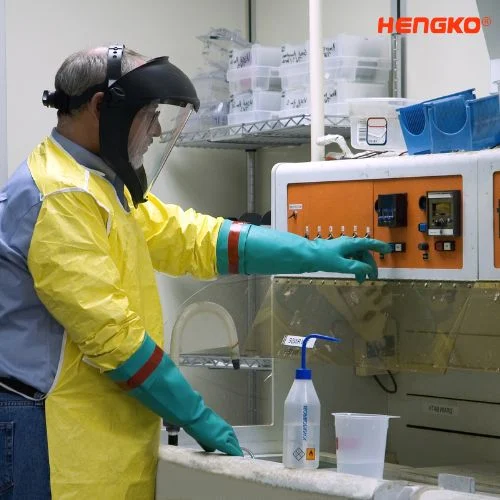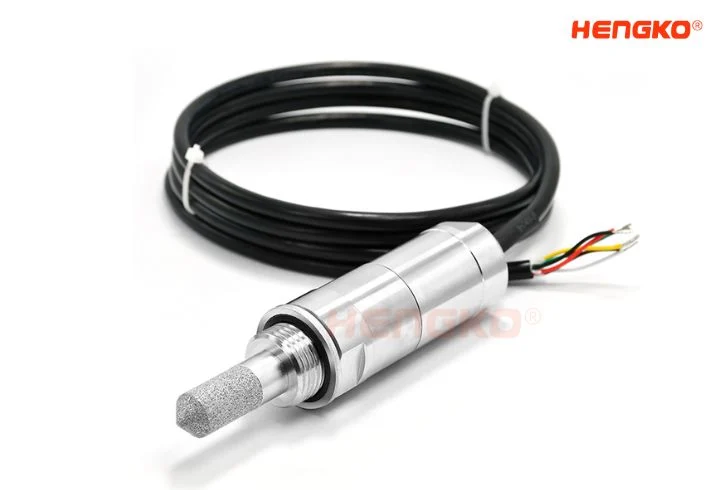Cleanroom Temperature & Humidity Monitoring
Ensuring Optimal Conditions for Precision and Compliance of Ceanroom
홈 " Cleanroom Temperature and Humidity Monitoring
Wide Humidity Transmitter to Solve Your Cleanroom Humidity Monitoring Problems
Comprehensive Solutions for Effective Cleanroom Humidity Control
To Solve Your Cleanroom Humidity Monitoring Problems by HENGKO’s Wide Humidity Transmitter Option
Maintaining optimal humidity levels in cleanrooms is crucial for ensuring product quality, safety, and compliance with industry standards. HENGKO offers a comprehensive solution to your cleanroom humidity monitoring needs with our wide range of humidity transmitters.
Benefits of Using HENGKO’s Humidity Transmitters:
- Enhanced Product Quality: By maintaining precise humidity levels, our transmitters help prevent contamination and ensure the integrity of sensitive products.
- Improved Compliance: Our transmitters aid in meeting stringent regulatory requirements, providing peace of mind and reducing the risk of non-compliance.
- 비용 효율성: With reliable performance and low maintenance needs, HENGKO’s humidity transmitters offer a cost-effective solution for cleanroom humidity monitoring.
HENGKO’s wide humidity transmitter options are the ideal choice for tackling cleanroom humidity monitoring challenges. Trust HENGKO to deliver the accuracy, reliability, and performance you need to maintain the highest standards in your cleanroom environment.
Several Probe Humidity Sensor Option - HG808 to Montoring Temp and Humidity. Dew Ponit for Cleanroom.
주요 기능
*The HG808 Air Duct Series Transmitter is equipped with a sensitive waterproof and anti fine dust high-temperature probe, with a temperature range of -60~60 ℃.
*표준 산업용 인터페이스 RS485 디지털 신호 출력 또는 4-20mA 아날로그 출력을 채택하고 디스플레이 기능이 있어 현장 디지털 디스플레이 미터, PLC, 주파수 변환기, 산업용 제어 호스트 및 기타 장비에 연결할 수 있습니다.
이슬점 + 모드버스 RS485 모두 출력
심플하고 우아한 통합 디자인
▪산업 등급 ESD 안전 보호 및 전원 공급 장치 역 연결 방지 설계
방수, 방진 및 고온 내성 프로브 사용
▪민감한 방수 및 미세먼지 방지 고온 프로브
▪표준 RS485 모드버스 RTU 통신 프로토콜
▪고정밀, 높은 안정성, LP66 방수 및 방진 등급
다양한 프로브 재료 사용 가능
Duct Humidity Temperature Sensor
HENGKO는 스테인리스 스틸 온도 및 습도 센서 프로브에서 이슬점 트랜스미터에 이르기까지 모든 요구 사항에 맞는 다양한 온도 및 습도 센서를 제공합니다. 당사의 센서는 정확하고 신뢰할 수 있으며 내구성이 뛰어나 다양한 애플리케이션에 이상적입니다.
4.1 이슬점 RS485 - 통합 덕트 프로브 시리즈
HENGKO는 스테인리스 스틸 온도 및 습도 센서 프로브에서 이슬점 트랜스미터에 이르기까지 모든 요구 사항에 맞는 다양한 온도 및 습도 센서를 제공합니다. 당사의 센서는 정확하고 신뢰할 수 있으며 내구성이 뛰어나 다양한 애플리케이션에 이상적입니다.
What Process of Cleanroom need to Monitor Temperature and Humidity ?
All cleanrooms need to monitor temperature and humidity. This is because temperature and humidity can affect:
- Yield: Improper temperature and humidity levels can damage products being manufactured in the cleanroom.
- Quality: Incorrect temperature and humidity can cause inconsistencies in the manufacturing process, leading to lower quality products.
- Comfort: Extreme temperatures and humidity levels can make it uncomfortable for workers, which can lead to errors.
Here are some additional points to consider:
- Standards: ISO 14644 sets forth guidelines for cleanroom classifications. These classifications include recommended temperature and humidity ranges.
- Specific processes: Some processes within a cleanroom may have even more specific requirements for temperature and humidity.

5-Factors You Should Care When Choose Humidity Transmitter for Your Cleanroom Monitoring ?
Here are 5 factors you should consider when choosing a humidity transmitter for your cleanroom monitoring:
정확성: This is the most important factor to consider. You need a transmitter that can measure humidity levels accurately over the entire range that will be used in your cleanroom.
응답 시간: This is the amount of time it takes for the transmitter to respond to changes in humidity levels. You need a transmitter with a fast response time so that you can take corrective action quickly if necessary.
Long-term stability: Over time, all transmitters can drift and become less accurate. You need a transmitter that is stable and will not require frequent calibration.
Calibration: Speaking of calibration, you need to consider how often the transmitter will need to be calibrated and how easy it is to calibrate.
비용: The cost of the transmitter is obviously a factor to consider. However, you should not sacrifice accuracy, response time, or stability for a lower price.
자주 묻는 질문
Why is temperature and humidity monitoring critical in cleanrooms?
Maintaining consistent and precise temperature and humidity levels is essential in cleanrooms for several reasons:
Product Yield and Quality: Improper temperature and humidity can negatively impact the manufacturing process of sensitive materials and products commonly found in cleanrooms. Delicate components used in electronics or pharmaceuticals can be damaged by fluctuations in temperature or excessive moisture. Inconsistent humidity can also lead to static discharge, which can damage sensitive electronic components.
Process Control: Many cleanroom processes are highly sensitive to temperature and humidity variations. For example, in microchip fabrication, even slight temperature changes can cause dimensional variations in the circuits. Precise humidity control is also crucial for processes like photolithography, which uses light-sensitive materials.
Worker Comfort and Safety: Extreme temperatures and humidity levels can create an uncomfortable work environment for cleanroom personnel. Discomfort can lead to fatigue, reduced concentration, and an increased risk of errors. Additionally, high humidity can promote the growth of mold and mildew, which can pose health risks.
What standards or guidelines exist for temperature and humidity in cleanrooms?
ISO 14644 is the international standard that outlines the classification of cleanrooms based on airborne particle concentration. This standard provides recommended ranges for temperature and humidity for different cleanroom classifications. However, it’s important to remember that these are recommendations, and specific processes within a cleanroom may have even tighter requirements. Consulting the technical specifications for the products or processes being conducted in the cleanroom is vital to determine the most appropriate temperature and humidity levels.
What are the key factors to consider when choosing a temperature and humidity monitoring system for a cleanroom?
Several factors come into play when selecting a monitoring system for your cleanroom:
정확성: This is paramount. Your system needs to deliver highly accurate measurements of both temperature and humidity across the entire range required for your specific cleanroom environment.
응답 시간: A fast response time ensures timely detection of any fluctuations in temperature or humidity. This allows for quick corrective actions to be taken before they can impact product yield or quality.
Data Logging and Alerting: The ability to continuously log data and generate alerts when pre-defined thresholds are breached is crucial. This data can be used for trend analysis, ensuring consistent environmental conditions and identifying potential issues before they escalate.
Sensor Suitability: Select sensors specifically designed for cleanroom environments. These sensors should be constructed from materials that are compatible with cleanroom cleaning protocols and not prone to particle shedding.
Wireless vs. Wired Systems: Wireless systems offer greater flexibility in terms of placement, but wired systems may provide a more reliable connection and be less susceptible to interference. Consider your cleanroom layout and prioritize data security needs when making this choice.
확장성: If you anticipate expanding your cleanroom operations in the future, choose a monitoring system that can be easily scaled to accommodate additional sensors and data points.
What are some best practices for cleanroom temperature and humidity monitoring?
Strategic Sensor Placement: Place sensors in critical locations throughout the cleanroom, considering potential sources of temperature or humidity variations like air handling units, doorways, and equipment.
Calibration and Maintenance: Regularly calibrate your sensors according to the manufacturer’s recommendations to ensure accuracy. Develop a preventative maintenance plan for your monitoring system to maintain optimal performance.
Data Analysis and Review: Routinely analyze the data collected by your monitoring system. Look for trends, identify potential issues, and take corrective actions when necessary. Data analysis can also help you optimize your cleanroom environment for improved process control and product quality.
Documentation and Record Keeping: Maintain detailed records of calibration certificates, maintenance logs, and sensor data. This documentation is essential for regulatory compliance and helps demonstrate your commitment to maintaining a controlled environment.
적합한 온도 및 습도 트랜스미터 찾기
오늘 프로젝트를 알려주세요
모니터 프로젝트 세부 정보를 알려주세요,
3일 이내에 경쟁력 있는 가격으로 최고의 솔루션을 제공해 드립니다.
3일 이내에 경쟁력 있는 가격으로 최고의 솔루션을 제공해 드립니다.

전 세계로 퍼뜨리기
HENGKO는 독특한 디자인과 뛰어난 성능으로 명성이 높은 산업용 센서 솔루션 분야의 글로벌 리더입니다. 당사의 온도 및 습도 트랜스미터와 센서는 식음료, 제약, 제조, 환경 모니터링 등 다양한 산업 분야에서 사용되고 있습니다.
0
+
수년간의 경험
0
전 세계 판매
0
K







